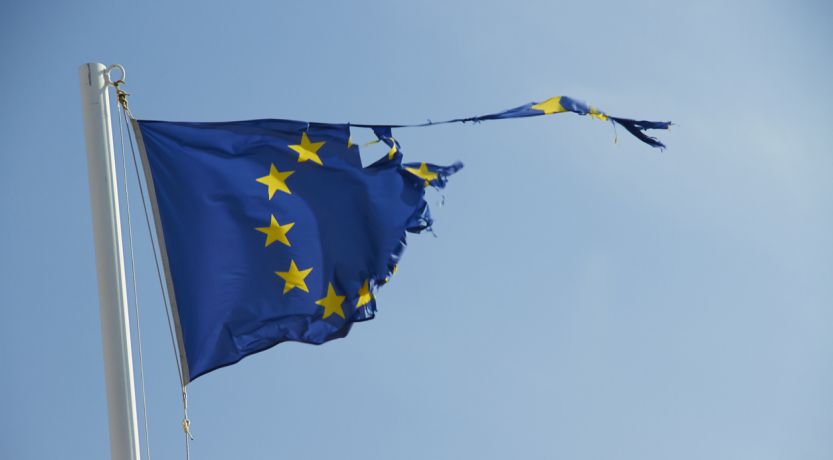Is Europe Coming Apart?
Europe seems to be falling apart, yet the Bible prophesies that it will amaze the world by rising into a powerful superstate in the future. How do current trends in Europe fit into Bible prophecy?

Europe today seems broken and dysfunctional. Many words could be used to describe the European Union—but united isn’t one of them. Instead of coming together into a stronger union, various forces are ripping it apart. These include:
- Brexit: The tumult and drama of the United Kingdom’s exit from the European Union has left the U.K. in a state of limbo and the EU with a cloud of uncertainty on how to move forward with or without the U.K.
- Currency union: The currency union between the richer northern European nations and the poorer southern nations remains fragile. Greece’s and Italy’s massive debts remain an issue that’s placing further strain on the stability of the euro.
- U.S.–European relations: The U.S. has been an instrumental power in rebuilding, supporting and defending Europe since the end of World War II. But an ever-growing rift between the U.S. and Europe has reached the point where the major powers of Europe are openly discussing the need for Europe to act unitedly and independently of the U.S. Yet as Germany and France grapple for power within Europe, they are alienating smaller nations and causing rifts.
The rise of the far-right
But the biggest issue facing Europe is the rise of nationalism and far-right political parties, fueled by a growing anti-immigration sentiment across the European continent. These include:
- Italy: Anti-immigration politician Matteo Salvini seeks to unite far-right parties to be “the force of government and change in Europe.”
- Hungary: Viktor Orban has been vilified in the EU because he has closed Hungary’s borders to immigrants. He sees himself as a savior of Hungary and Europe and promotes a Europe more strongly rooted in its Christian heritage.
- Germany: The far-right party Alternative for Deutschland won 94 seats in the 2017 election, becoming the first far-right group to enter the German Bundestag since World War II. The rise of the AfD has caused many in Germany to fear the return of a political ideology that resembles Adolf Hitler’s National Socialism. The AfD has been very vocal in its criticism of Angela Merkel’s immigration and centrist policies and sees Islam as a threat to Germany and Europe. A recent poll has indicated that the AfD has become the second most popular party in Germany.
- France: Marine Le Pen has rebranded her far-right party as “National Rally” in an attempt to appeal to the mainstream—and separate herself from the radical and racist image of her father, Jean-Marie Le Pen. She has campaigned on scrapping the European Commission and establishing stronger national borders to limit immigration (especially from Islamic countries).
There isn’t room here to cover the other nationalistic movements rising across Europe, such as the Vox Party in Spain, the Sweden Democrats, the Finns Party, Estonia’s EKRE, the Slovenian Democratic Party, the Danish People’s Party, Netherlands’ Freedom Party and Austria’s Freedom Party. All these parties share a common vision for Europe (centered less on the EU and more on the nation-state) and an end (or severe limits) to Islamic immigration into the continent.
The fear of war
The European project started after World War II as a way to prevent another European war by uniting the economic interests of the European nations. Herman Van Rompuy described that goal this way in his 2012 speech accepting the Nobel Peace Prize on behalf of the European Union:
Though the Bible does prophesy that Europe will be involved in another world war, it will not be the same as Europe’s past wars.
“War is as old as Europe. Our continent bears the scars of spears and swords, cannons and guns, trenches and tanks, and more. … Yet, after two terrible wars engulfed the continent and the world with it, finally lasting peace came to Europe. … This is where the European Union’s ‘secret weapon’ comes into play: an unrivaled way of binding our interests so tightly that war becomes materially impossible.”
In a 2010 speech, Mr. Van Rompuy said that he believed the rise of “Euroscepticism” and nationalism could lead to another European war. “The biggest enemy of Europe today is fear. Fear leads to egoism, egoism leads to nationalism, and nationalism leads to war.”
Though the Bible does prophesy that Europe will be involved in another world war, it will not be the same as Europe’s past wars. In this future war, a large bloc of European nations will be united—but this unity will not prevent war.
A new union
An April 29 article published in the Berlin Policy Journal titled “States of Europe, Unite!” proposes a simple solution to Europe’s problems: form a stronger union modeled on the United States, a so-called United States of Europe. The authors suggested that a crisis, followed by strong collective action, would provide Europe’s best opportunity to unite even further to create a more powerful union.
Here are a couple of interesting quotes from this article:
“How then can Europeans regain their sovereignty, as France’s President Emmanuel Macron so eloquently demands? The answer is as simple as it is difficult for many to imagine: sovereignty or power is like money. Where there is none, none can be distributed. That’s why Europe itself must ‘become a power,’ as former German Foreign Minister Joschka Fischer aptly put it at a recent conference.”
“History shows that successful unions do not emerge from gradual processes in times of peace and tranquility, but rather as a consequence of sharp disruptions during periods marked by extreme crises. Successful unions happen as a result of events, of collective efforts by its citizens. Europe now needs such an event: a full debt and defense union underpinned by parliament is the only way to resolve Europe’s crisis and sustainably mitigate external threats. Only then can Europe finally become the positive force on the world stage that it should be.”
The rest of the above article provides insightful reading.
What Bible prophecy reveals about Europe’s future
The Bible actually shows that Europe will unite in a different way than it has in its past history. Instead of being united through the conquest of a dominant leader arising in a single nation, Europe will be united by consensus—likely motivated by a global crisis. The Bible calls this future system “the beast.”
Here are some details we know about this end-time European superpower. It will be:
- A union of 10 nations or groups of nations: The end-time European power will be comprised of 10 leaders who govern 10 nations, or possibly 10 groups of nations (Revelation 17:12).
- A central power: These 10 leaders will voluntarily cede their power (or most of their power) to one leader, also known as “the beast.” For a short time, this man will wield political control over the union (verse 13).
-
A military superpower: The government and leader will be so powerful many will wonder, “Who is able to make war with him?” (Revelation 13:4). This power will be so pompous and confident in itself that it will even lead an attack on the returning Jesus Christ (Revelation 17:14).
- An economic superpower: This European power will control the world economy to the point that people will not be able to “buy or sell” unless they comply with the beast’s rules (Revelation 13:17)
- In league with a religious power: The new union will be closely allied to a false religious system under a leader that the Bible calls the “false prophet.” This man will claim the very power of Jesus Christ. The power behind this religious leader is actually Satan, the great counterfeiter (Revelation 12:9; 13:1; 16:13-14 ; 17:3-6).
Though this new power will arise in Europe and affect the entire world, many seem to be unaware of what is coming. It is likely this power will arise out of the present-day EU or perhaps in the aftermath of the EU’s disintegration. Time will tell—so keep watching.
Date Posted: June 3, 2019



